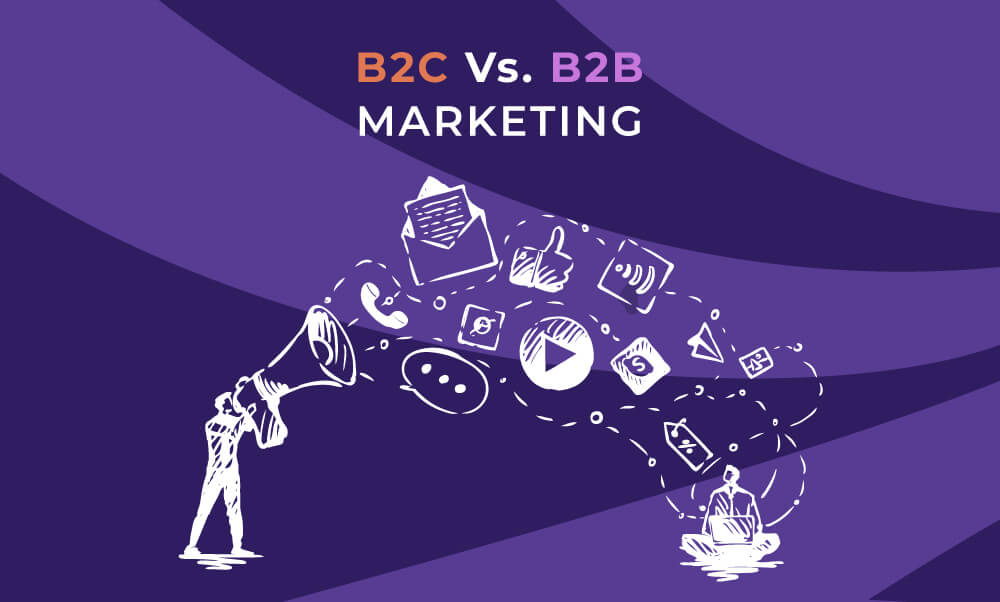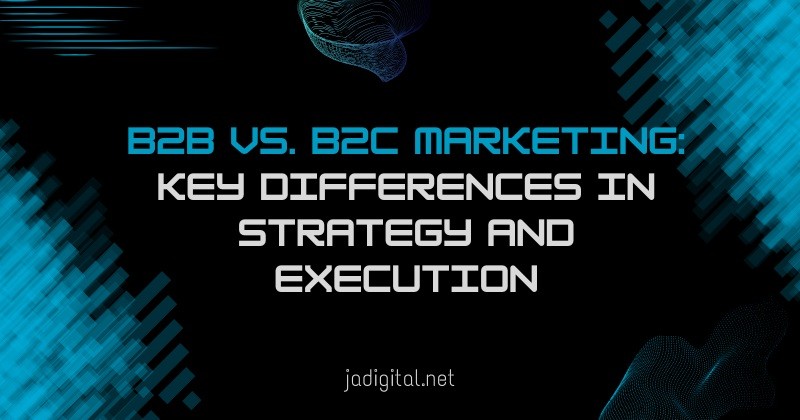Marketing strategies for B2B (business-to-business) and B2C (business-to-consumer) differ greatly. Each targets unique audiences with specific needs and behaviors.
Understanding these differences is crucial for effective marketing. B2B marketing often focuses on building relationships, providing detailed information, and offering solutions for business problems. It involves longer sales cycles and is more content-driven. B2C marketing, on the other hand, aims at quick, emotional purchases.
It uses broader reach tactics, appealing directly to consumers’ desires and needs. These contrasting strategies mean execution must be tailored accordingly. By grasping these key differences, businesses can refine their approach, ensuring they effectively engage their target market and drive better results.

Credit: herbig.co
Quick Navigation
Target Audience
Understanding the target audience is crucial in both B2B (Business to Business) and B2C (Business to Consumer) marketing. Knowing who you are talking to shapes the strategy and execution of your marketing efforts. Let’s dive into the differences in target audience for B2B and B2C marketing.
Decision Makers
In B2B marketing, you often deal with a group of decision-makers. These can include managers, department heads, and even C-suite executives. Each has their own concerns and priorities.
Addressing the pain points of each decision-maker is crucial. For instance, a CFO might be interested in cost savings, while a department manager is more concerned about the effectiveness of your solution.
In contrast, B2C marketing usually targets an individual consumer. Here, the decision-making process is faster and often influenced by emotions or immediate needs. Think about how you decide to buy a pair of shoes. It’s mostly a personal choice, right?
Consumer Needs
B2B customers are generally looking for solutions that can improve their business operations. They focus on ROI (Return on Investment), efficiency, and long-term benefits. Offering detailed case studies and ROI calculations can be effective.
B2C consumers, however, look for products or services that fulfill immediate needs or desires. They are more likely to respond to emotional triggers, discounts, and product features. Ever noticed how holiday sales draw your attention with flashy ads and big discounts?
So, how well do you know your target audience? Understanding these differences can make or break your marketing campaign. Tailor your message accordingly and watch your engagement soar.

Credit: www.leadsquared.com
Sales Cycles
Understanding the sales cycles in B2B and B2C marketing is crucial. These cycles determine the pace and approach of your marketing efforts. Let’s dive into the key differences.
Length And Complexity
B2B sales cycles are typically longer and more complex. Businesses often require detailed information and multiple approvals. This process involves various stakeholders.
B2C sales cycles are usually shorter and simpler. Consumers often make quicker decisions. They rely on emotions and personal needs. This leads to faster purchases.
Relationship Building
In B2B marketing, relationship building is vital. Establishing trust with clients is key. Long-term partnerships often drive success. Networking and personalized communication play significant roles.
In B2C marketing, relationship building focuses on brand loyalty. Engaging customers through social media and customer service is essential. Positive experiences lead to repeat purchases.
Marketing Channels
B2B marketing focuses on building relationships and long-term partnerships. B2C marketing aims to attract and convert individual consumers quickly. Different strategies are needed for each.
Marketing Channels play a crucial role in shaping your marketing strategy, whether you are targeting businesses (B2B) or individual consumers (B2C). The channels you choose directly impact your message delivery and audience engagement. Understanding the key differences in the marketing channels used for B2B and B2C can dramatically improve your strategy’s effectiveness.Digital Platforms
Digital platforms are essential for both B2B and B2C marketing, but their use differs significantly. B2B marketing often focuses on LinkedIn, where professionals network and companies showcase their expertise. This platform allows you to connect with decision-makers directly. On the other hand, B2C marketing thrives on platforms like Facebook, Instagram, and TikTok. These channels offer a more visual and interactive experience, perfect for engaging a broad audience. They provide tools for creating dynamic content that can go viral, reaching potential customers quickly. Consider how you use email marketing. In B2B, emails are often detailed, focusing on whitepapers or case studies. They aim to build trust and provide value. B2C emails, however, are usually shorter and more promotional, designed to drive immediate sales.Traditional Media
Traditional media still has a place in today’s marketing landscape. B2B campaigns might utilize trade magazines, industry conferences, and direct mail. These channels are effective for targeting specific industries and establishing authority. In contrast, B2C marketing often leverages TV commercials, radio ads, and print media. These channels reach a broader audience and create brand awareness. Think of how a catchy jingle can make a brand memorable. While traditional media can be more costly, it can also be incredibly effective. Imagine seeing your favorite brand’s commercial during a major event—it’s likely to leave a lasting impression. Which traditional media channels have you found most effective in your marketing efforts? Reflecting on your experiences can help you refine your strategy. Understanding these differences in marketing channels can help you tailor your approach, ensuring your message reaches the right audience in the most effective way.Content Strategies
B2B marketing focuses on building long-term relationships and trust between businesses. B2C marketing, on the other hand, aims to attract and engage individual customers quickly. Different strategies and execution techniques are essential for success in each approach.
When it comes to B2B and B2C marketing, content strategies play a crucial role in attracting and engaging the right audience. Both types of marketing require unique approaches tailored to their distinct audiences. Let’s break down the key differences in content strategies for B2B and B2C marketing.Educational Content
B2B marketing thrives on educational content. Business buyers are looking for information that helps them make informed decisions. Whitepapers, case studies, and in-depth articles are highly effective. They should offer valuable insights and data that support the buyer’s journey. B2C, on the other hand, benefits from lighter educational content. Think blog posts, how-to guides, and product reviews. These should be easy to digest and directly relevant to the consumer’s needs.Emotional Appeal
In B2C marketing, emotional appeal is a powerful tool. Consumers often make purchasing decisions based on how a product makes them feel. Storytelling, vibrant visuals, and relatable scenarios can create a strong emotional connection. For instance, a heartfelt story about how a product improved someone’s life can be very compelling. B2B marketing usually takes a more rational approach, but that doesn’t mean emotions are irrelevant. Building trust and demonstrating reliability can evoke positive emotions. Sharing testimonials and success stories can help foster confidence and credibility. Engaging your audience effectively means understanding what drives them. Are you focusing on educating a business buyer, or are you appealing to a consumer’s emotions? Tailoring your content strategy to your audience’s needs is key. What type of content do you find most engaging? How can you apply these strategies to your own marketing efforts?
Credit: searchengineland.com
Conclusion
Understanding the differences between B2B and B2C marketing is crucial. Each approach requires unique strategies. B2B focuses on building relationships and long sales cycles. B2C aims for quick transactions and emotional appeal. Tailor your marketing to your audience’s needs. This ensures better engagement and results.
Always keep your target market in mind. Adjust your tactics accordingly. This helps to create effective and successful campaigns. Remember, knowing your audience drives your marketing success.
Last Updated on March 22, 2025 by JADigital Editorial
